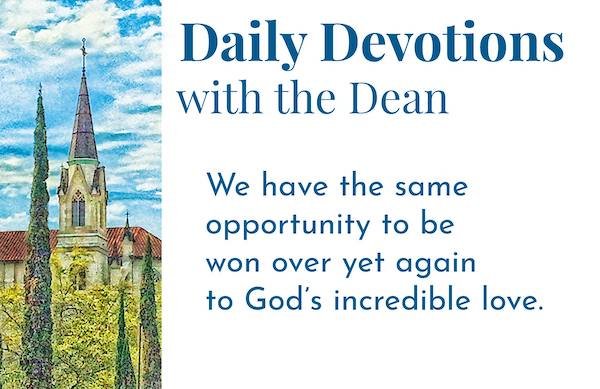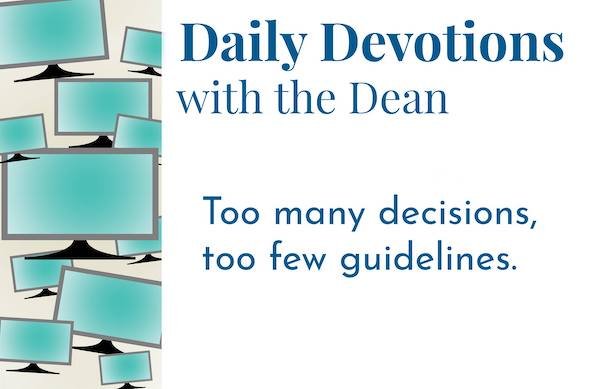Monday • 10/23/2023 •
Monday of the Twenty-first Week After Pentecost (Proper 24)
This morning’s Scriptures are: Psalm 25; Jeremiah 44:1–14; 1 Corinthians 15:30–41; Matthew 11:16–24
This morning’s Canticles are: following the OT reading, Canticle 9 (“The First Song of Isaiah,” Isaiah 12:2–6, BCP, p. 86); following the Epistle reading, Canticle 19 (“The Song of the Redeemed,” Revelation 15:3–4, BCP, p. 94)
Welcome to Daily Office Devotions, where every Monday through Friday we explore that day’s Scripture readings, as given in the Book of Common Prayer. I’m Reggie Kidd. Thanks for joining me. This Monday in the Season After Pentecost our readings finds us in Proper 24 of Year 1 in the Daily Office Lectionary.
The key to 1 Corinthians 15 (and indeed to the whole of Paul’s correspondence with the Corinthians) is what he says in 1 Corinthians 15:16: “For if the dead are not raised, then Christ has not been raised.” Paul is not dealing with people who deny Christ’s resurrection. He is dealing with people who do not understand what his rising from the dead means, who do not understand the bigger picture without which his resurrection is meaningless. What is at issue is not the fact of Jesus’s resurrection, but its place in God’s story and our story.
Not only did Jesus’s bodily resurrection really take place in normal space-time history, teaches Paul, that happening was not a one-time, special exception to the general rule of death. Jesus’s particular resurrection was a foretaste and guarantee of the general resurrection of the dead. Paul calls Jesus’s resurrection an aparchē, a “first fruits”: “But in fact Christ has been raised from the dead, the first fruits of those who have died” (1 Corinthians 15:20). Every farmer knows that once the “first fruits” of a crop has come in, the rest of the crop will of necessity follow. Our general resurrection will certainly take place now that its “first fruits,” Christ’s resurrection, has occurred.
In today’s passage, then, Paul makes two essential points.
First: resurrection-less faith is vain and hedonistic faith. “If the dead are not raised, ‘Let us eat and drink, for tomorrow we die’” — 1 Corinthians 15:32. If there’s no resurrection to look forward to, says Paul, the Christian faith is vain and empty, worthy only of being ignored, if not scorned. If there’s no resurrection to look forward to, we should just become Epicureans.
What is stupefying to Paul is that the Corinthians are trying to adjust the faith to make it fit a belief system in which there is no resurrection to look forward to, no matter what happened to Jesus! Sadly, as we have seen in our read-through of 1 Corinthians, their relationships show them to be practical hedonists.
For their part, the Corinthians have accommodated their Christian hope to prevailing attitudes about death, not unlike people today. Back then, people either romanticized about Elysian fields on the other side of death, or they resigned themselves to a sentiment expressed in the most popular tombstone of the day, “I was, I am not, I will not be. I care not.”
The Corinthians had a flair for worship, but when thinking about death, they seem eerily akin to people in our own world. Even if Corinthian Christians do embrace the miracle of Jesus’s resurrection from the dead, they (at least the ones Paul addresses in this chapter) think the only resurrection that happens to them is in their minds, not their bodies.
Today, even among many church people (especially in mainline denominations) there is as much skepticism about the entire notion of bodily resurrection as there is among the un-churched and the de-churched. People tend either romantically to think that death means they pass on to a ghostly eternity of golf tee-times with a spirit-Jesus, and of reunions with the spirits of departed relatives or spouses or friends or pets. Or, with gritty realism, they resign themselves to death as a real and final terminus that has been made palatable by the knowledge that they have lived as best they can “as if” they had been raised to newness of life by the myth/legend/story of Jesus’s resurrection from the dead.
Second: resurrection faith produces wonderment and genuine charity. We only know so much about how our resurrection bodies will be constituted, but we can expect to be amazed: “…as for what you sow, you do not sow the body that is to be…” — 1 Corinthians 15:37). God will give us a body “as he has chosen,” with a materiality and a glory appropriate to the age to come. But we can count on the fact that we are moving from this present age of “lesser” (less substantiality, less glory) to that future age of “greater” (greater substantiality, greater glory). We will be astounded at what we will be, captured nicely in C. S. Lewis’s phrase, “everlasting splendors.”
Of utmost importance for the Corinthians and for us, is that this confidence about the future will make us different people in the present. As Lewis put it in the closing of his famous “Weight of Glory” sermon — a passage worth citing at length:
It may be possible for each to think too much of his own potential glory hereafter; it is hardly possible for him to think too often or too deeply about that of his neighbour. The load, or weight, or burden of my neighbour’s glory should be laid daily on my back, a load so heavy that only humility can carry it, and the backs of the proud will be broken. It is a serious thing to live in a society of possible gods and goddesses, to remember that the dullest and most uninteresting person you talk to may one day be a creature which, if you saw it now, you would be strongly tempted to worship, or else a horror and a corruption such as you now meet, if at all, only in a nightmare. All day long we are, in some degree, helping each other to one or other of these destinations. It is in the light of these overwhelming possibilities, it is with the awe and the circumspection proper to them, that we should conduct all our dealings with one another, all friendships, all loves, all play, all politics. There are no ordinary people. You have never talked to a mere mortal. Nations, cultures, arts, civilization—these are mortal, and their life is to ours as the life of a gnat. But it is immortals whom we joke with, work with, marry, snub, and exploit—immortal horrors or everlasting splendours. This does not mean that we are to be perpetually solemn. We must play. But our merriment must be of that kind (and it is, in fact, the merriest kind) which exists between people who have, from the outset, taken each other seriously—no flippancy, no superiority, no presumption. And our charity must be a real and costly love, with deep feeling for the sins in spite of which we love the sinner—no mere tolerance or indulgence which parodies love as flippancy parodies merriment. Next to the Blessed Sacrament itself, your neighbour is the holiest object presented to your senses. If he is your Christian neighbour he is holy in almost the same way, for in him also Christ vere latitat—the glorifier and the glorified, Glory Himself, is truly hidden.
Be blessed this day,
Reggie Kidd+













